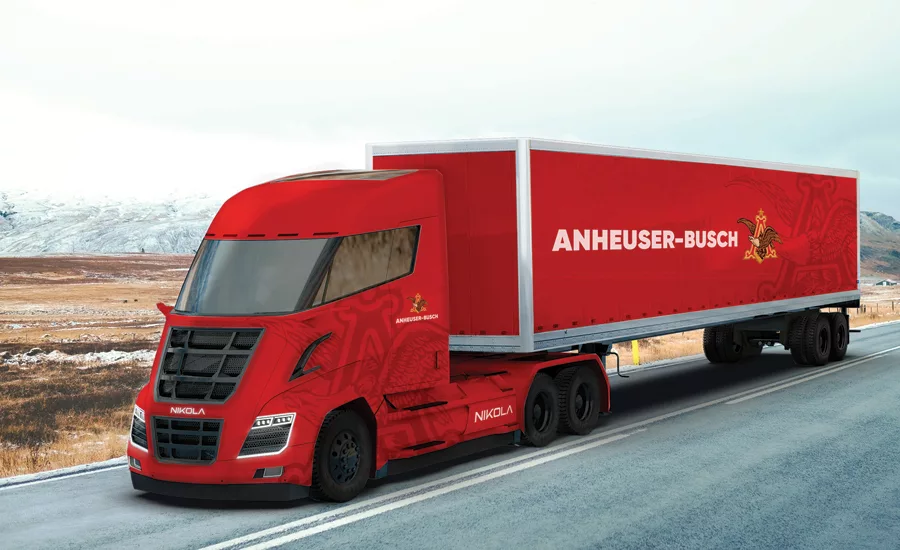Beverage fleets get wired for the future of delivery
Electric vehicles offer fleets expanded sustainability options

Last spring, Anheuser-Busch placed an order for up to 800 hydrogenelectric-powered semi-trucks from Nikola Motor Co. (Image courtesy of Anheuser-Busch/Jeff Cioletti)
A few years back, it seemed that any significant deployment of all-electric or hydrogen-electric vehicles in the beverage space was the stuff of science fiction.
Major beverage fleets would’ve ordered one or a handful of such trucks, mostly for public relations purposes, but the recent purchase announcements from big players on both the alcohol and non-alcohol side of the business mean that the future is a lot closer than we once thought.
Last spring, St. Louis-based Anheuser-Busch (A-B), the North American unit of Anheuser-Busch InBev, placed an order for up to 800 hydrogen-electric-powered semi-trucks from Salt Lake City, Utah-based Nikola Motor Co. The zero-emission trucks, which Nikola says will be able to travel between 500 and 1,000 miles and be refilled within 20 minutes, should begin integration into the A-B fleet within the next two to three years, the company says.
“We start testing with Anheuser-Busch on the road next year and 2021 is when we expect certification to come in for the full sale,” says Trevor Milton, chief executive officer at Nikola.
These vehicles use a fuel cell that convert hydrogen to electricity, emitting none of the tailpipe emissions that petroleum-based fuels generate. That’s a slight contrast with all-electric vehicles, whose batteries are charged by plugging into an electric power source.
Nikola starts building the stations next year and it will take about two years for those to be brought fully online, Milton says. Once that infrastructure is ready, the company expects to deliver about 200 trucks a year to A-B, through about 2026, he adds.
Infrastructure, or lack thereof, has been a major barrier with hydrogen-electric technology. However, these vehicles are particularly suitable for the beverage business because delivery routes — especially between the mega-brewer and its distribution network — are largely fixed, he says.
“The nice thing about the beverage industry is they’re all dedicated routes and they run the same routes every day,” Milton notes.
Nikola then can plan its infrastructure around those routes without worrying about them dramatically changing in the foreseeable future.
“It enables us to build out infrastructures, 700 stations long, over the next 10 years,” Milton says. The company expects those 700 stations to be spread across the entire United States and Canada.
By that time, coverage would be roughly equivalent to that of diesel.
The Nikola deal is a key part of A-B’s 2025 Sustainability Goals, which includes reducing the company’s carbon emissions by 25 percent across its supply chain. A-B projects that once all 800 Nikola vehicles are deployed throughout its business seven to eight years from now, those trucks alone will represent a CO2 emissions reduction of 18 percent: that is roughly equivalent to annually removing 13,000 passenger vehicles from the road, it says.
A few months before A-B InBev announced the Nikola deal, PepsiCo, Purchase, N.Y., unveiled a plan of its own, putting in an order for 100 all-electric trucks from San Carlos, Calif.-based Tesla. PepsiCo will deploy the vehicles across both its beverage and snacks divisions.
“At PepsiCo, we are committed to finding innovative ways to minimize our impact on the environment, which also reduces our operating costs,” says PepsiCo’s Vice President of Supply Chain Mike O’Connell. “Delivering products using a more efficient fleet is a key component of achieving PepsiCo’s goal to reduce absolute greenhouse gas emissions across our value chain by at least 20 percent by 2030.”
The company notes that as technology changes at an ever-increasing rate, it continues to explore emerging distribution technologies that will position its supply chain for the future.
“We believe achieving a more fuel-efficient and sustainable fleet is a continuous process,” O’Connell says. “... One that requires forward-thinking and a willingness to adapt to a changing technological landscape.”
Another indicator that electric delivery vehicles are here to stay is that engine manufacturer Cummins, well known for its diesel and natural gas-powered engines, has been making significant strides in the electric space.
In summer 2017, the company unveiled a Class 7 heavy-duty truck cab with a 140-kilowatt-hours battery pack, which the company plans to start rolling out by the end of 2019. Its 100 mile-range makes it ideal for delivery in urban environments.
And, this past July, the company announced its acquisition of Silicon Valley-based Efficient Drivetrains, which produces all-electric, as well as hybrid, power solutions for commercial vehicles.
Meanwhile, Motiv Power Systems, Foster City, Calif., has been wooing distributors with its Electric Powered Intelligent Chassis (EPIC), an all-electric solution designed for medium-duty applications. The electric chassis offers the same performance and functionality as its diesel and gasoline equivalents with none of the emissions, the company says.
As equipment manufacturers get ready to reveal their 2019 product plans, we expect to see many more companies plugging in to the future of beverage distribution. BI
Looking for a reprint of this article?
From high-res PDFs to custom plaques, order your copy today!





